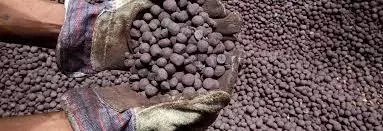List of Mineral Resources in Nigeria
Minerals are pure inorganic substances that occurs naturally in the earth’s crust. Some minerals consist of a single element such as gold, silver, diamond (carbon) and sulphur while some exist as an inorganic compound formed by various combinations of the eight elements (O, Si, Al, Fe, Ca, Na, K and Mg).
More than two thousand minerals have been identified and these makes up about 98.5% of the earth crust. Industry depends on about 80 of the known minerals.
👉 Relocate to Canada Today!
Live, Study and Work in Canada. No Payment is Required! Hurry Now click here to Apply >> Immigrate to CanadaThe minerals in Nigeria’s landscape are distributed in all the geopolitical zones of the country and are found to be associated with the major rock types that constitute its geology.
Read Also: List of Solid Minerals in Nigeria and Where to Find Them

The rock types have produced numerous mineral raw materials such as gold, lead, zinc, tantalite, coal, bitumen, limestone kaolin, etc.
The Nigeria geological survey agency classified mineral resources into two broad categories namely:
1. Demand driven Mineral commodities.
2. Mineral commodities suitable for export.
A mineral resource is a concentration or occurrence of mineral materials of intrinsic economic interest in or on the earth’s crust in such form and quantity that there are reasonable prospects for eventual economic extraction.
Mineral resource are non-renewable and include metals and non-metals. Nigeria, is a country blessed with a good amount of minerals, some of which have been extracted and serving as the greatest foreign income earner for the country like the crude oil while some are still unexplored.
👉 Relocate to Canada Today!
Live, Study and Work in Canada. No Payment is Required! Hurry Now click here to Apply >> Immigrate to CanadaNigeria is endowed with Mineral Resources such as cassiterite, columbite, lead, Gold, Barite, gypsum, bitumen, coal etc. and the mineral industry remains the main source of Nigeria’s foreign exchange and provides more than 90% of the country’s export value.
Despite the numerous amount of mineral resources Nigeria is blessed with, the country seems to rely majorly on crude oil (petroleum) exploration while the other minerals are measly exploited.
In an attempt to reverse the reliance on petroleum, a bold step was taken to revamp the solid mineral industry through the establishment of the then Ministry of Solid Mineral Development in 1995, which today is known as the Ministry of Mines and Steel development.
This ministry is now restructured and a new law, the Nigeria minerals Mining act, 2007, and also a National minerals and metals policy (January 2008) put in place.
Similarly several agencies (e.g. the Geological Survey agency and mining cadastre) under the Ministry have been restructured to ensure better performance in the sector. Despite all of this development, the industry is still far from achieving its goals.
The geological survey agency of Nigeria and the ministry of mines and steel development have reported the occurrence of more than 34 minerals in over 450 locations spread across the entire country, which are in various stages of development.
Records from the Nigeria Geological Survey Agency and the Mining Cadastral office indicates that as at November 2000, a total of 1265 exploration license (EL) and 88 small scale Mining licenses (SSML) have been issued to mining companies, and they are expected to operate on a combined total of 53 mineral types.
Read Also: 25 Popular Mining Companies in Nigeria
List of Mineral Resource in Nigeria, Location and Reserve Estimates
1. Barites
Locations: Benue, Cross Rivers, Adamawa, Yobe, Nasarawa, Enugu, Taraba State
Reserve Estimate (MT): 2,000,000
2. Bentonite
Locations: Yobe, Abia, Anambra, Adamawa, Edo, Imo, Ebonyi, Akwa Ibom, Cross Rivers, Benue, Borno State
Reserve Estimate (MT): 1,200,000
3. Columbite
Locations: Plateau, Kano, Kaduna, Bauchi, Kogi, Kwaara, Nasarawa States
Reserve Estimate (MT): Not Available (N/A)
4. Cassiterite
Locations: Plateau, Bauchi, Kano, Cross Rivers, Ekiti, Kaduna, Nasarawa, Taraba States
Reserve Estimate (MT): 300,000
5. Coal
Locations: Benue, Enugu, Nasarawa, Gombe, Edo, Anambra, Abia, and Ondo States
Reserve Estimate (MT): 500,000,000
#6. Dolomite
Locations: Kogi, Oyo, Edo, Nasarawa, Kaduna States and FCT
Reserve Estimate (MT): 16,540,000
7. Marble
Locations: Oyo, Edo, Nasarawa, Kogi, Katsina, Niger and FCT
Reserve Estimate (MT): 80,292,000
8. Gold
Locations: Cross Rivers, Edo, Kaduna, Katsina, Kebbi, Niger, Osun, Zamfara States
Reserve Estimate (MT): N/A
9. Gypsum
Locations: Adamawa, Taraba, Benue, Gombe, Ogun, Imo and Borno States
Reserve Estimate (MT): 2,000,000.00
10. Iron ore
Locations: Kogi, Nasarawa state
Reserve Estimate (MT): 478,000,000
11. Gemstone
Locations: Plateau, Bauchi, Yobe, Borno, Ogun, Ondo, Kwara, Kogi and Imo States
Reserve Estimate (MT): N/A
12. Kaolin
Locations: Katsina, Plateau, Ogun, Bauchi, Ekiti, Ondo and Anambra States
Reserve Estimate (MT): 3,600,000
13. Lead/Zinc
Locations: Nasarawa, Plateau, Taraba, Bauchi, Gombe, Ebonyi, Imo, Kano and Benue States
Reserve Estimate (MT): 20,000
14. Tantalite
Locations: Nasarawa, Kaduna, Kwara, Kogi States
Reserve Estimate (MT): N.A
15. Limestone
Locations: Enugu, Cross Rivers, Ogun, Edo, Benue, Gombe, Sokoto, Adamawa, Ebonyi, Imo and Yobe States etc
Reserve Estimate (MT): 1,355,980,000
16. Talc
Locations: Niger, Osun, Kwara, Kogi, Kaduna States and FCT
Reserve Estimate (MT): 40,000
17. Granite
Locations: Plateau, Ondo, Ogun, Bauchi, Borno, Adamawa, Kogi, Cross Rivers, Oyo and Imo States
Reserve Estimate (MT): 3,000,000.00
18. Salt
Locations: Nasarawa, Taraba, Enugu, Cross Rivers, Benue, and Ebonyi States
Reserve Estimate (MT): N/A
Read Also: 15 Problems Facing Nigeria Economy and Possible Solutions
19. Wolframite
20. Barites
21. Marble
22. Trona
23. Feldspar
24. Dimension stone
25. Clay
26. Silicon sand
27. Crude oil
28. Rutile
29. Bitumen
30. Kyanite
31. Bismuth
32. Mica
33. Manganese
34. Molybdenum
35. Phosphate
36. Diatomite
37. Fluorite
Below are the selective description of some of these minerals:
Bismuth
Bismuth is a brittle metal with a silvery white colour when freshly produced, but surface oxidation can give it a pink tinge.
It is used in a number of very different applications. The majority is consumed in bismuth alloys and in pharmaceuticals and chemicals. The remainder is used in ceramics, paints, catalysts and a variety of minor applications.
Bismuth metal is relatively inert and non – toxic. It has replaced toxic lead in many applications such as plumbing, bullets, birdshot, metal alloys and soldering. Bismuth compounds are used in stomach-upset medicines, treatment of stomach ulcers, soothing creams and cosmetics.
Bitumen
Bitumen is a dense, highly viscous, petroleum – based hydrocarbon that is found in deposits such as oil sands, or obtained as a residue in the distillation of crude oil. It is principally used in road construction.
Read Also: Top 10 Popular Natural Resources in Abia State and their Economic Values
Cassiterite
Cassiterite is a tin oxide mineral, SnO2 and the main ore of tin. It is generally opaque, but is translucent in thin crystals. Its luster and multiple crystal faces produce a desirable gem.
Clay
There are many different clay minerals that are used for industrial applications. Clays are used in the manufacturing of paper, refractories, rubber, ball clay, dinnerware and pottery, floor and wall tile, sanitary wear, fire clay, fire bricks, foundry sands, drilling mud, iron -ore pelletizing, absorbent and filtering materials and cosmetics.
Coal
Coal is combustible black or brownish-black sedimentary rock usually occurring in rock strata in layers or veins called coal beds or coal seams. Coal is basically used in the generation of electricity, steel production and cement manufacturing as a liquid fuel.
Columbite
Columbite is a black mineral group that is an ore of niobium. It has a submetallic luster and a high density and is a niobate of iron and manganese. It forms a series with the tantalum-dominant analogue ferrotantalite and one with the manganese-dominant analogue manganocolumbite.
Niobium is used in alloys for improved strength. It has also shown superconductive properties and is being studied with other metals for a possible breakthrough alloy.
Diatomite
This is a rock composed of the skeletons of diatoms, single -celled organisms with skeleton made of silica which are found in fresh or salt water. Diatomite is primarily used for filtration of drinks such as juices and wines but it is also being used as filter in paints, pharmaceuticals and environmental clean – up technologies.
Feldspar
Feldspar is a rock- forming mineral. It is used in glass and ceramic industries, pottery, porcelain and enamelware, soaps, bond for abrasive wheels, cement, glues, fertilizer and tarred roofing materials and as a sizing or filler in textiles and paper applications.
Iron Ore
Iron ores are rocks and minerals from which metallic iron can be economically extracted. The ores are usually rich in iron oxides and vary in colour from dark grey, bright yellow, or deep purple to rusty red. The iron itself is usually found in the form of magnetite, hematite, goethite, limonite or siderite.
Lead
Lead is a soft, malleable and heavy metal with a relatively low melting point. It is a chemical element with symbol Pb and atomic number 82. When freshly cut, lead is bluish-white; it tarnishes to a dull gray color when exposed to air.
Lead is used in the manufacture of storage batteries. It is used in ammunitions (shot and bullets) and as a constituent of solder, type metal, bearing alloys, fusible alloys, and pewter.
Limestone
Limestone is a sedimentary rock, composed mainly of skeletal fragments of marine organisms such as coral, forams and molluscs. Its major materials are the minerals calcite and aragonite, which are different crystal forms of calcium carbonate.
Limestone is used in the production of cement and is also employed in glass making. It also has wide application in substances such as manufacture of quicklime, slaked lime and mortar.
Read Also: 25 Popular Mining Companies in Nigeria
Zinc
Zinc is a silvery-white metal with a blue tinge. It tarnishes in air. It is a chemical element with symbol Zn and atomic number 30.
Zinc is used to galvanize other metals such as iron in order to prevent rusting. Galvanized steel is used for car bodies, street lamp posts, safety barriers and suspension bridges.
Zinc is also used in alloys such as brass, nickel silver and aluminum solder. It is also widely used in the manufacture of products such as paints, rubber, cosmetics, pharmaceuticals, plastics, inks, soaps, batteries, etc.




